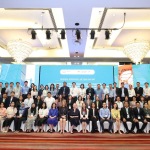Total number of posts 463.
The Association of Southeast Asian Nations (ASEAN) is in the process of finalizing negotiations on the Digital Economy Framework Agreement (DEFA), with the aim of officially signing the pact in 2026. It is expected to establish a strong foundation for ASEAN to become a leading region in the digital economy, serving as a comprehensive document that synthesizes various action plans related to digital transformation and the digital economy into a unified strategy.
At a press conference on October 7 in Jakarta, Mr. Airlangga Hartarto - Indonesia’s Coordinating Minister for Economic Affairs, announced that ASEAN is continuing to negotiate several core articles of DEFA. The agreement is expected to include areas such as financial services, non‑discrimination with digital products, submarine telecommunications cables cooperation, and electronic payments.
ASEAN’s digital economy could reach USD 2 trillion by 2030
According to estimates, ASEAN’s digital economy could double if DEFA is successfully implemented. Under a business‑as‑usual scenario, the region’s digital economy is projected to reach about USD 1,000 billion by 2030. However, if DEFA is signed and implemented effectively, that figure could rise to USD 2,000 billion.
Currently, ASEAN’s internet economy is estimated at USD 263 billion in 2024, with Indonesia contributing approximately USD 90 billion.
Mr. Airlangga expressed hope that DEFA can be officially signed in 2026 and promptly implemented in practice to harness the large potential of Southeast Asia, a region with more than 460 million Internet users and increasing adoption of digital services.
Timor‑Leste may not ready to join from the outset
In the context of Timor‑Leste becoming ASEAN’s 11th full member at the Summit expected to be held in late October 2025 in Kuala Lumpur, Malaysia, the question arises whether Timor‑Leste can simultaneously join in signing DEFA.
Speaking to the media, Minister Airlangga stated that Timor-Leste may require additional time to complete its domestic legal framework before it can join the agreement. ASEAN will continue to facilitate Timor-Leste in adjusting its national regulations. However, given the country’s current situation, it is highly likely that Timor-Leste will not be able to participate in the DEFA by 2026.
Timor-Leste submitted its application to join ASEAN in 2011, but it was not until 2022 that the bloc “agreed in principle” to its accession. The country still faces numerous challenges, including limited infrastructure and a significant development gap compared to existing ASEAN members.
Towards a fully digital ASEAN
Promoting the signing of DEFA demonstrates ASEAN countries’ collective effort to build a more deeply integrated digital economy region, increase global competitiveness, and reduce the digital development gap among its members. Although much work remains, this is seen as a strategic step in the region’s journey toward digital transformation.
Source: Compiled by the Multilateral Trade Policy Department, Ministry of Industry and Trade of Viet Nam














